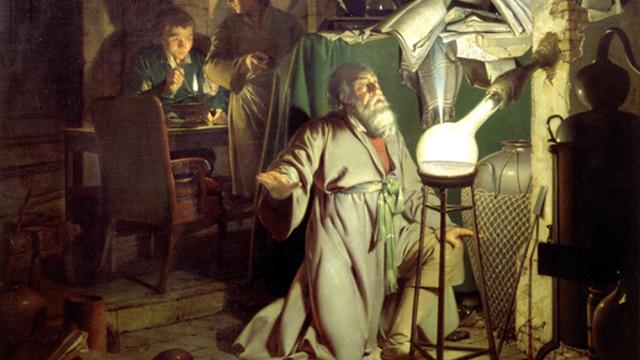Henning Brand’s name might not immediately ring a bell, but we wouldn’t have a number of life’s simplest joys were it not for the 17th century alchemist’s lifelong quest to transmute urine into solid gold.
Image: Joseph Wright of Derby, The Alchemist Discovering Phosphorus (1771)
Like any alchemist worth his salt, Brand was chiefly concerned with discovering the philosopher’s stone – the fabled substance that could allow a person to convert base metals (such as mercury) into even more valuable substances such as gold. Much of Brand’s work involved him experimenting with solutions of water and various other compounds in a number of different formulations, but it wasn’t until he started messing around with urine – yes, urine – that he made his first major (and accidental) breakthrough.
Chemist and science writer John Emsley explained during the most recent episode of NPR’s Planet Money that urine had become the object of fascination for many alchemists during the 17th century – partially because of its bright, golden colour, but mainly because of how abundant it was. Because everybody pees, alchemists such as Brand saw urine as a potential literal goldmine. If they could only figure out how to convert it into actual gold, they could become wealthy beyond their wildest dreams.
Brand spent most of his time cooking pee down in different ways and hoping that something fantastical might happen. Quite randomly on one day in 1669, he was shocked to discover that at least one of his pee experiments resulted in a flammable, softly-glowing green substance. The astonished Brand believed that he’d discovered the philosopher’s stone, but in actuality, he’d stumbled upon phosphorous, a chemical element that’s required for all living things to survive.
Though Brand and a colleague didn’t fully understand what it was that he’d discovered, that didn’t stop them from touring all across Europe to show off the mysterious, glowing ball of pee. As gross as that may sound, the world’s arguably a better place for it. In addition to keeping us alive, phosphorous is commonly used in a variety of applications we benefit from on a daily basis. Toothpastes, fertilisers, certain soft drinks – none of them would be possible without phosphorous and we might not have discovered it if Henning Brand hadn’t been hellbent on experimenting with pee. Science!
